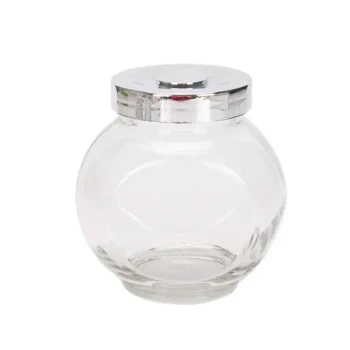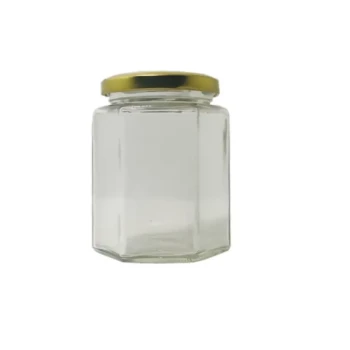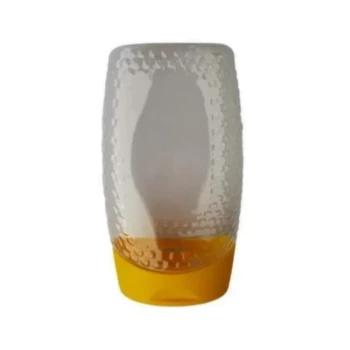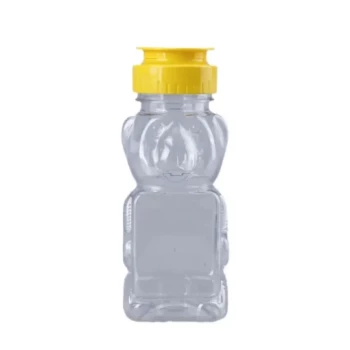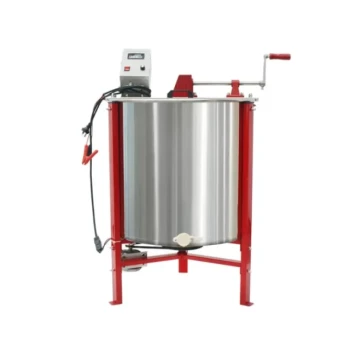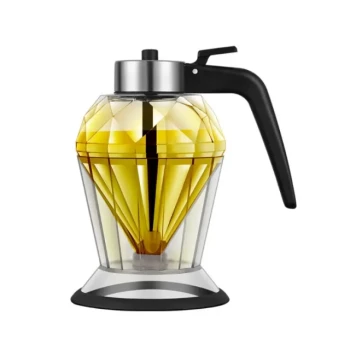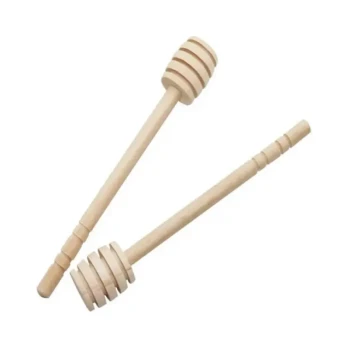For everyday use, the answer is no. Using a stainless steel spoon to scoop honey from a jar is perfectly safe and will not affect its quality, taste, or chemical composition. The contact is far too brief for any meaningful reaction to occur.
The core issue isn't about spoons, but about long-term storage. While brief contact is harmless, honey's natural acidity means that only specific materials, like food-grade stainless steel, are suitable for long-term contact without degrading the honey.
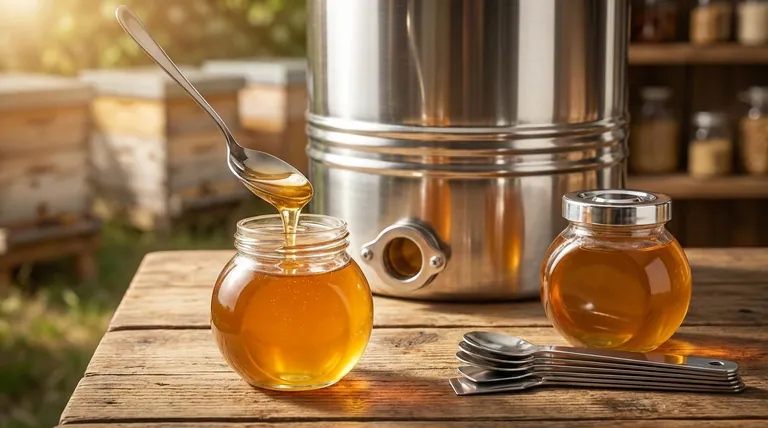
Why Material Choice Matters for Honey
Understanding why certain materials are recommended over others comes down to one key property of honey: its acidity.
The Natural Acidity of Honey
Honey is naturally acidic, with a pH typically ranging between 3.4 and 6.1. This acidity acts as a natural preservative, preventing the growth of bacteria and other microbes.
However, this same acidic property can cause a reaction when it comes into prolonged contact with certain materials.
The Problem with Reactive Metals
When honey is stored in contact with reactive metals—such as iron, zinc, copper, or aluminum—its acidity can slowly corrode the metal.
This corrosion can leach metallic ions into the honey. This not only imparts an undesirable metallic taste and darkens the honey's color but can also render it unsafe for consumption.
Stainless Steel: The Professional Standard
Stainless steel is the material of choice in the professional honey industry for a specific reason: its resistance to corrosion.
What Makes Stainless Steel Different?
Unlike other metals, stainless steel contains chromium. The chromium reacts with oxygen in the air to form a thin, stable, and non-reactive (or "passive") layer on the steel's surface.
This passive layer acts as a barrier, protecting the underlying steel from the corrosive effects of honey's acid.
The Importance of "Food-Grade"
Not all stainless steel is created equal. For honey processing and storage, professionals exclusively use food-grade stainless steel, typically types 304 or 316.
These grades have a higher percentage of chromium and nickel, offering superior corrosion resistance, ensuring that absolutely nothing leaches into the honey, even over months or years of storage.
Understanding the Trade-offs: Short-Term vs. Long-Term Contact
The distinction between a quick scoop and long-term storage is the most critical factor.
Everyday Use (Spoons and Utensils)
Using a stainless steel spoon to serve honey is completely harmless. The contact time is measured in seconds, which is insufficient to cause any chemical reaction. Concerns about this practice are unfounded.
Long-Term Storage (Tanks and Containers)
This is where material choice is paramount. For storing honey beyond a few weeks, you must use a non-reactive container.
Glass is an excellent and accessible choice for consumers. For beekeepers and commercial producers, food-grade stainless steel vats and extractors are the industry standard for ensuring the purity and safety of the final product. Using a non-food-grade metal container for bulk storage is a significant risk to your honey's quality.
Making the Right Choice for Your Honey
Your choice of equipment should always be guided by your intended use and the duration of contact.
- If your primary focus is serving or daily consumption: Using any standard stainless steel spoon or utensil is perfectly safe and will not affect your honey.
- If your primary focus is home storage (weeks to months): Store your honey in glass jars with well-sealed lids to ensure maximum purity.
- If your primary focus is bulk processing or long-term storage: You must use equipment and containers made from food-grade stainless steel (304 or 316) to prevent contamination.
By choosing the right material for the job, you ensure your honey remains as pure and delicious as the day it was harvested.
Summary Table:
| Contact Type | Material Recommendation | Why It's Important |
|---|---|---|
| Serving / Daily Use | Any Stainless Steel Spoon | Brief contact is harmless; no reaction occurs. |
| Home Storage (Weeks/Months) | Glass Jars | Prevents any potential long-term interaction. |
| Bulk Processing / Long-Term Storage | Food-Grade Stainless Steel (304/316) | Essential for preventing corrosion and metallic contamination. |
Protect the purity of your honey harvest with professional-grade equipment from HONESTBEE.
As a commercial beekeeper or distributor, the quality of your honey is your reputation. Using the correct food-grade stainless steel equipment is not just a recommendation—it's a necessity for ensuring your product remains safe, pure, and market-ready.
HONESTBEE supplies the durable, corrosion-resistant beekeeping supplies and equipment you need for extraction, processing, and bulk storage. Our wholesale-focused operations are designed to meet the demands of commercial apiaries and equipment distributors.
Ensure your honey's quality from hive to jar. Contact our experts today to discuss your equipment needs and get a quote!
Visual Guide
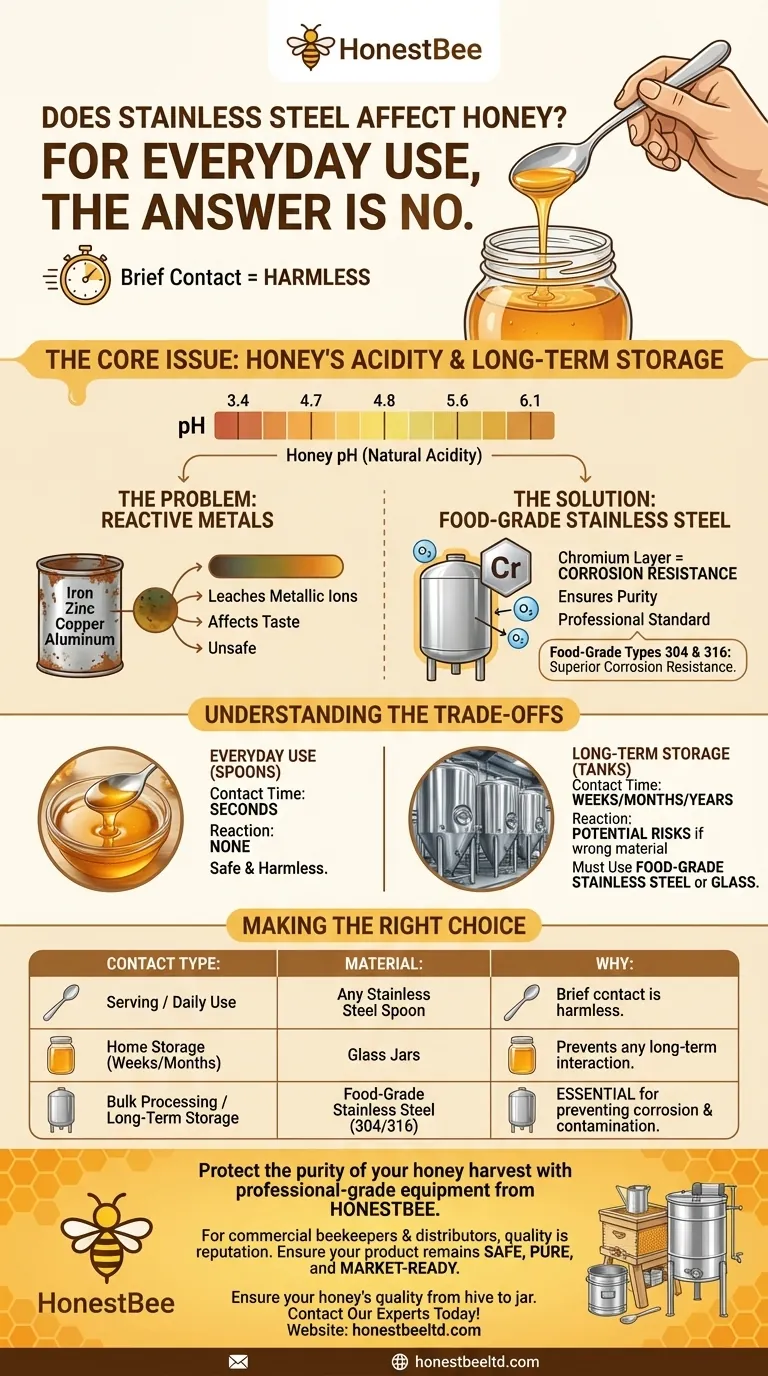
Related Products
- Classic Drum Shaped Glass Honey Jar with Airtight Lid
- Hexagonal Glass Honey Jars with Metal Lug Caps Elegant Versatile Packaging
- Inverted Squeezable Honey Jar with No Drip Flip Top Cap for Easy Pouring
- Classic Honey Bear Jars with Flip Top Dispensing Cap for Liquid Sweeteners
- 24 Frame Honey Extractor Commercial Radial Honey Frame Extraction Machine
People Also Ask
- Why is the use of hermetic plastic pots mandatory for honey storage? Essential Protection for Honey Quality
- What is the standard weight of one gallon of honey? A Critical Guide for Commercial Beekeepers and Distributors
- Why are dedicated plastic containers with sealing lids required for honey? Ensure Sample Integrity & Accuracy
- What are the storage recommendations for raw honey? Keep Your Honey Fresh & Flavorful for Years
- What role do collection containers play in the extraction and initial processing of stingless bee honey? A Quality Guide
- What are the recommended storage containers and conditions for liquid honey? Expert Tips for Peak Preservation
- What are the primary functions of high-capacity storage drums? Optimize Your Bulk Honey Logistics and Quality
- What are the advantages of using industrial-grade plastic buckets for raw honey logistics? Ensure Purity and Durability
